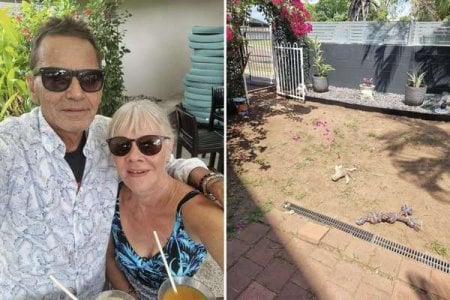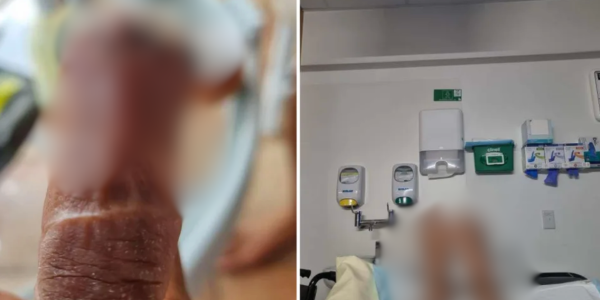Dad reveals ‘deadly invisible threat’ in garden after falling extremely ill: ‘It ended up so bad’
By
Seia Ibanez
- Replies 0
Content Warning: This article contains descriptions and images involving an amputated finger and toes, as well as mentions of gangrene and septicaemia. Reader discretion is advised.
Gardening is often seen as a therapeutic and rewarding activity, especially for those who have more time to enjoy their backyards in their later years.
However, a harrowing story from a Darwin local serves as a stark reminder that even the most innocuous of hobbies can carry hidden dangers.
Mark, a 59-year-old dad, was simply sprucing up his garden to make his property more appealing to potential buyers when he came face-to-face with a life-threatening situation.
‘I was doing a lot of digging, laying new turf and plants and whatnot,’ he said.
‘I was actually doing it sometimes while it was raining because it was nice and cool.’

After spending several hours landscaping in the rain, he unknowingly contracted melioidosis, a serious infectious disease caused by the bacterium Burkholderia pseudomallei, which is found in tropical soil and water.
‘The garden I was working on was a tiny, little garden, but it’s still in the soil. It’s in the soil everywhere. It really is so easy to catch,’ Mark said.
Melioidosis, also known as Whitmore's disease, is particularly prevalent in Southeast Asia and Northern Australia, especially during the wet season when heavy rains can stir up the bacteria from the soil.
In the past year, the Northern Territory has seen five fatalities due to this disease, and experts like Professor Bart Currie from the Menzies School of Health Research warned that cases are expected to rise.
Mark's ordeal began with what seemed like a summer flu, marked by lethargy and ‘had a bit of cough’.
‘Then I woke up one night at 3:30 am and woke my partner up and said “I’m having real trouble breathing”,’ he said.
However, he had ‘no idea’ what was to come.
‘Within two hours, I was placed in an induced coma, and as it transpired, my left lung had collapsed, one of my kidneys and my liver had failed. I was like that for just a bit over three weeks,’ Mark explained.
The infection led to septicaemia and gangrene, resulting in the amputation of toes and part of a finger.
Even now, Mark is still undergoing regular tests and has lost sensation in his feet.
‘The period of time I was in the ICU, three people died from it,’ he said.
‘It doesn’t discriminate. My immune system wasn’t bad at all… because I had probably had it for two to three weeks and let it sort of breed basically in my body, is how it ended up so bad.’
Professor Currie, who was leading in his care, told his partner Sue that Mark was ‘the sickest man in the NT’.
To protect yourself from this invisible killer, it's crucial to take preventative measures, especially if you live in or visit tropical regions.
‘Just wear your gloves; don’t even go near the water in the wet season with any open wounds,’ Mark urged, adding to not walk around outside ‘at all’ while raining.
During the wet season, avoid direct contact with soil and muddy water, particularly if you have open wounds or cuts.
Wearing gloves, a mask, and closed footwear while gardening or doing yard work can significantly reduce the risk of infection. It's also advised to stay indoors during storms and heavy rain.
For those with underlying health conditions such as diabetes, heavy alcohol consumption, cancer, kidney, and lung disease, additional precautions are necessary.
Ensuring bore water is disinfected before use and reducing alcohol intake can help mitigate the risk.
While a vaccine for melioidosis is still in development, awareness and preventive actions are our best defence against this disease. Remember, even if you've had melioidosis before, reinfection is possible.

Have you or someone you know been affected by melioidosis? Share your experiences in the comments below.
Gardening is often seen as a therapeutic and rewarding activity, especially for those who have more time to enjoy their backyards in their later years.
However, a harrowing story from a Darwin local serves as a stark reminder that even the most innocuous of hobbies can carry hidden dangers.
Mark, a 59-year-old dad, was simply sprucing up his garden to make his property more appealing to potential buyers when he came face-to-face with a life-threatening situation.
‘I was doing a lot of digging, laying new turf and plants and whatnot,’ he said.
‘I was actually doing it sometimes while it was raining because it was nice and cool.’

Mark almost lost his life when he contracted an ‘invisible threat’ while working in his garden. Credit: Mark
After spending several hours landscaping in the rain, he unknowingly contracted melioidosis, a serious infectious disease caused by the bacterium Burkholderia pseudomallei, which is found in tropical soil and water.
‘The garden I was working on was a tiny, little garden, but it’s still in the soil. It’s in the soil everywhere. It really is so easy to catch,’ Mark said.
Melioidosis, also known as Whitmore's disease, is particularly prevalent in Southeast Asia and Northern Australia, especially during the wet season when heavy rains can stir up the bacteria from the soil.
In the past year, the Northern Territory has seen five fatalities due to this disease, and experts like Professor Bart Currie from the Menzies School of Health Research warned that cases are expected to rise.
Mark's ordeal began with what seemed like a summer flu, marked by lethargy and ‘had a bit of cough’.
‘Then I woke up one night at 3:30 am and woke my partner up and said “I’m having real trouble breathing”,’ he said.
However, he had ‘no idea’ what was to come.
‘Within two hours, I was placed in an induced coma, and as it transpired, my left lung had collapsed, one of my kidneys and my liver had failed. I was like that for just a bit over three weeks,’ Mark explained.
The infection led to septicaemia and gangrene, resulting in the amputation of toes and part of a finger.
Even now, Mark is still undergoing regular tests and has lost sensation in his feet.
‘The period of time I was in the ICU, three people died from it,’ he said.
‘It doesn’t discriminate. My immune system wasn’t bad at all… because I had probably had it for two to three weeks and let it sort of breed basically in my body, is how it ended up so bad.’
Professor Currie, who was leading in his care, told his partner Sue that Mark was ‘the sickest man in the NT’.
To protect yourself from this invisible killer, it's crucial to take preventative measures, especially if you live in or visit tropical regions.
‘Just wear your gloves; don’t even go near the water in the wet season with any open wounds,’ Mark urged, adding to not walk around outside ‘at all’ while raining.
During the wet season, avoid direct contact with soil and muddy water, particularly if you have open wounds or cuts.
Wearing gloves, a mask, and closed footwear while gardening or doing yard work can significantly reduce the risk of infection. It's also advised to stay indoors during storms and heavy rain.
For those with underlying health conditions such as diabetes, heavy alcohol consumption, cancer, kidney, and lung disease, additional precautions are necessary.
Ensuring bore water is disinfected before use and reducing alcohol intake can help mitigate the risk.
While a vaccine for melioidosis is still in development, awareness and preventive actions are our best defence against this disease. Remember, even if you've had melioidosis before, reinfection is possible.
Key Takeaways
- A Darwin man nearly lost his life after contracting melioidosis from soil while landscaping his garden, despite having no visible cuts or wounds.
- Melioidosis, known as the 'great mimicker,' is an infectious disease found in tropical soil and water, and cases are expected to rise in the Northern Territory.
- After developing severe symptoms and being hospitalised, the man endured a three-week induced coma, multiple organ failures, septicaemia, and eventual amputations on his feet and a hand.
- Health officials advise wearing gloves and masks when working with soil, avoiding contact with stagnant water and soil during the wet season, and staying indoors during heavy rains and storms to prevent melioidosis infection.








